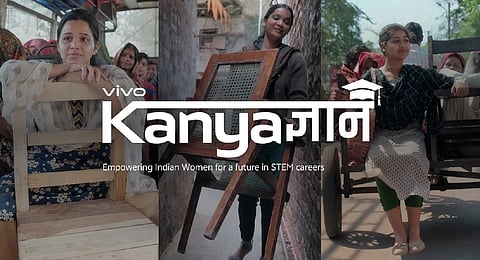

NEW DELHI: A video showing young schoolgirls carrying chairs in their hands and on their heads, travelling long distances from their small towns and villages by cycle, bus, and even boat to reach a large hall where a professor teaches them science, technology, engineering, and mathematics (STEM), has gone viral.
The digital campaign - Building Futures for Young Women in STEM - launched to celebrate International Women’s Day, showcases how young Indian girls from underserved communities, who continue to face financial constraints and societal barriers, are now coming out and choosing STEM to change not only their lives but also their communities.
The campaign, which features the inspirational song "On the move, her dreams are on the move, scaling the walls of destiny, her dreams are on the move, travelling a great distance and miles to go, yes, miles to go," is part of the vivo KanyaGyaan project, which provides scholarships to young girls who want to pursue STEM careers but are unable to due to financial constraints.
Since its launch in 2023, the pan-India programme has provided financial aid and a holistic support system that includes merit-based scholarships, mentorship, and industry exposure to equip beneficiaries with the skills and confidence needed to transition to the corporate world.
Since its launch, the programme has impacted the lives of 150 beneficiaries across 18 states, with the highest representation from Maharashtra (18 per cent), Tamil Nadu (17 per cent), and Delhi (14 per cent). Over 60 per cent come from families earning less than Rs 1 lakh annually, and 15 per cent have been raised by single parents.
The need to launch such a project was felt because it was seen that despite technology advancing at an unprecedented pace and an ever-growing demand for skilled professionals in STEM, the gender gap in STEM fields poses a challenge, especially for young women from underserved communities in India who lack access to opportunities and support.
Recognising this urgent need, Vivo India, a technology brand, launched "vivo KanyaGyaan," a nationwide initiative dedicated to empowering Indian women to pursue STEM careers in the future.
Geetaj Channana, Head of Corporate Strategy, Vivo India, says, "Empowering young women in STEM isn’t just an initiative - it’s a necessity for real progress. Through the 'vivo KanyaGyaan' initiative, we’re breaking barriers by providing education, mentorship, and opportunities that help them shape their futures."
"Our Women’s Day campaign film captures this spirit with the metaphor of 'carrying their chairs' - a symbol of determination and self-empowerment. With this, we hope to inspire a larger movement toward empowerment and action in STEM."
Many of the beneficiaries are young women who are first-generation graduates, thus breaking generational cycles of limited access to education and economic opportunity.
The programme aims to empower young girls and shape a more inclusive and diverse STEM workforce, driving long-term social and economic progress. One beneficiary is 21-year-old Tanushri Pahari.
Hailing from Kanker village in Chhattisgarh, she is now working for an NGO where she uses the skills she gained during her scholarship period to change the lives of communities around her.
"Growing up, I knew where I came from. I knew the expectations placed on me - study hard, help at home, and follow the traditional path. But for me, life was always about rising above and doing more than just surviving," she said.
Despite many challenges, the young girl, who studied biology and maths, dared to dream big - studying biotechnology. She was admitted to NIT, Raipur, and also won a silver medal. It was in her second year that she learned about the vivo KanyaGyaan Scholarship Programme. She applied for the 'Women in STEM' initiative and was offered financial aid.
"Getting the scholarship changed everything. The programme offered more than just financial aid; it provided the mentorship, support, and skills I needed to thrive. It allowed me to focus fully on my education and led me to publish two research papers. Additionally, I discovered my passion for social causes. These experiences deepened my desire to make a meaningful impact and give back to society," she said.
Like her, Swaroopa Sanjay Kanade, from Niphad village in Nashik, Maharashtra, comes from a farming family. Today, she stands tall, thanks to the scholarship programme.
Once shy and uncertain, Swaroopa gained confidence, refined her communication skills, and adapted to corporate culture. Today, she is a graduate engineer trainee at a leading multinational company, earning Rs 4.6 lakh per year - a tenfold increase from her family's previous income.
Her journey proves that young women from underserved communities can thrive in STEM and beyond with the right support, determination, and opportunities.
According to reports, India has the highest percentage of women STEM graduates in the world - about 40 per cent in 2021-22, but only 14 per cent of STEM jobs in the country are held by women.